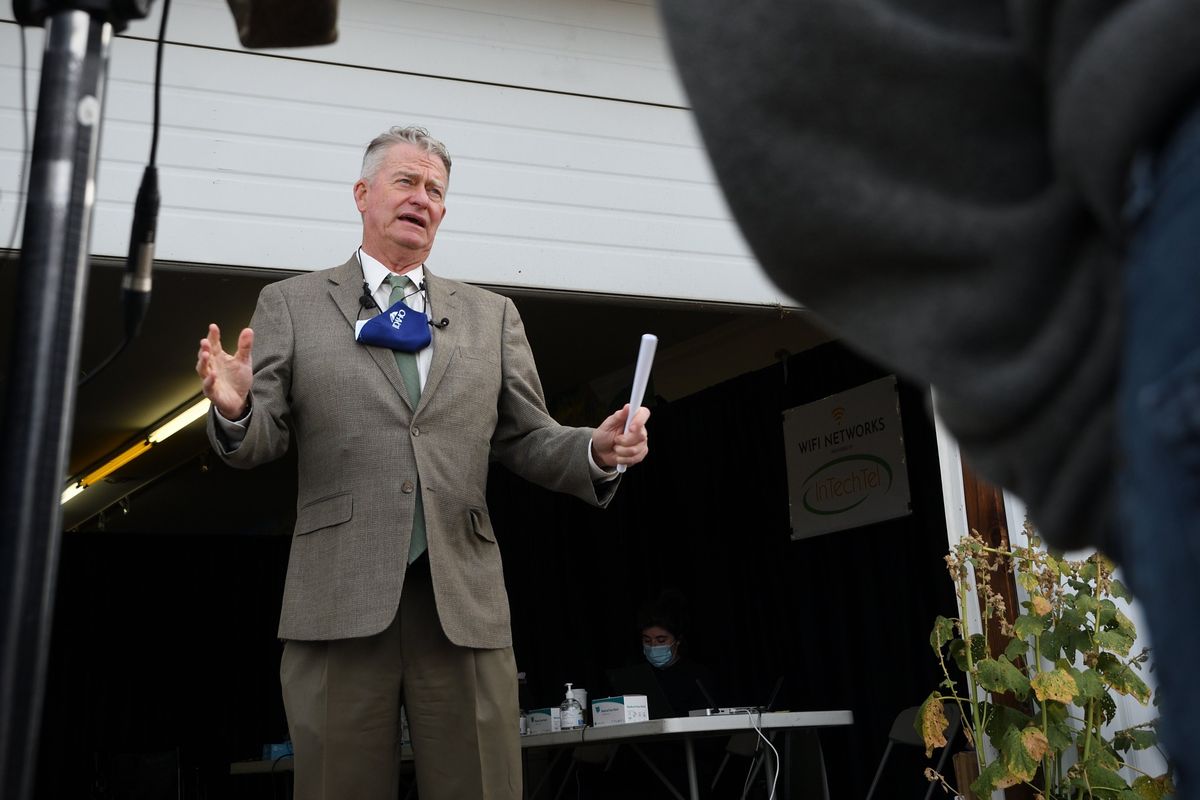Little tours CdA monoclonal antibody site, but encourages Idahoans to get vaccinated instead of relying on ‘tool’

Idaho Gov. Brad Little toured a makeshift monoclonal antibody site at the Kootenai County Fairgrounds on Wednesday and touted the benefits of the treatment while strongly emphasizing every Idahoan should get vaccinated.
Little’s Coeur d’Alene visit comes at a time when North Idaho and Eastern Washington hospitals are overwhelmed with COVID-19 patients. Many medical facilities don’t have enough staff to treat people with conditions that aren’t immediately life threatening.
“If you get into a bad car wreck, or you have a heart attack, you’re going to get care, but it’s close right now,” Little said.
Monoclonal antibody treatments can help people sick with COVID-19 stay out of the hospital, which in turn eases some of the burden on health care providers.
Injecting a person with the lab-grown antibodies can enhance their immune system, helping them recover when they might otherwise get sicker and require a hospital stay.
“You’re boosting your antibody response,” said Leslie Stone, a nurse and vice president of clinical operations leading Heritage Health’s fairgrounds site. “It targets the (COVID-19 virus) spike proteins so they can’t permeate the patient’s cells.”
The treatment is available to people who have tested positive for COVID-19 and have a referral from their doctor. Patients receive four shots during their appointment – the shots can go in the upper thighs, back of the arms and abdomen – and the facility can handle up to 48 patients a day.
Little said the monoclonal antibody site, which comprises six rooms separated by black curtains in the taxidermy-decorated North Idaho Wildlife Center, is an important part of the region’s COVID-19 response.
Since it was set up on Sept. 15, the site has treated 198 people who had mild to moderate COVID-19 symptoms. None of them has been hospitalized since being injected with monoclonal antibodies, and none has had adverse effects from the treatment.
“Every patient out of the ICU is more hospital capacity for somebody else,” Little said. “It means the patients in the ICU are going to get a little bit better care.”
But even though monoclonal antibodies are helping keep COVID-19 patients out of the hospital, they aren’t a cure-all, Little said. He said getting vaccinated should be Idahoans’ main focus.
“We know that vaccination works,” Little said.
Just 58% of Idahoans 12 and older have gotten at least one dose of a COVID-19 vaccine. Within the Panhandle Health District, which covers North Idaho, only 47% of residents 12 and older have gotten at least one dose.
Monoclonal antibody treatments are incredibly expensive, too, Little said. He said it costs the federal government about $2,000 to treat one person with monoclonal antibodies while getting vaccinated costs the government $20.
Little said even though Idaho hospitals are overwhelmed or struggling to treat everyone who needs medical care, he’s not going to impose a mask mandate or a vaccine mandate. He said he doesn’t think either action would be effective in Idaho.
“There has to be some level of acceptance,” he said. “The higher the authority that makes the request – I think particularly in Idaho, given our demographics – the lower the application.”
Health districts and cities should consider imposing restrictions in the name of public health, Little said.
“If your mayor or school board or your local health district makes a request, then you’re going to have a lot better buy-in than you do if it comes from either the governor or the president,” he said.
Throughout the pandemic, Little has consistently passed the mask mandate decision onto local authorities. In the vast majority of cases, local Idaho governments and health districts have declined to impose mandates, even when COVID-19 patients have overrun their hospitals and reduced access to medical care.
Little reiterated that vaccination is critical.
“Monoclonal antibodies are a tool,” Little said. “My first choice, always, for people, is to talk to their doctor, talk to their health care provider and choose to get vaccinated. That’s the ideal situation.”